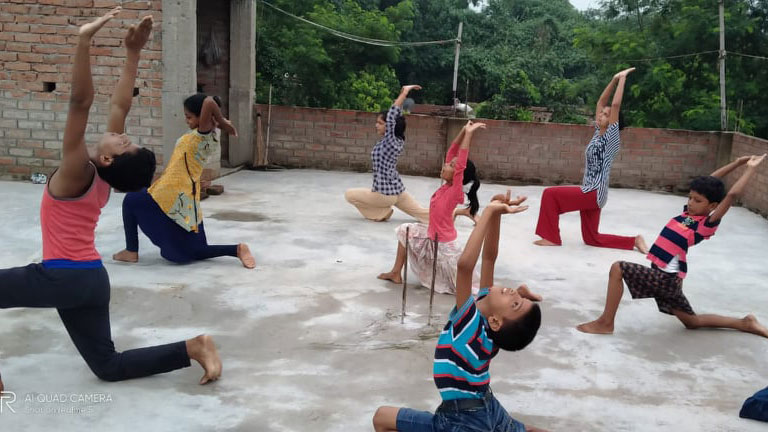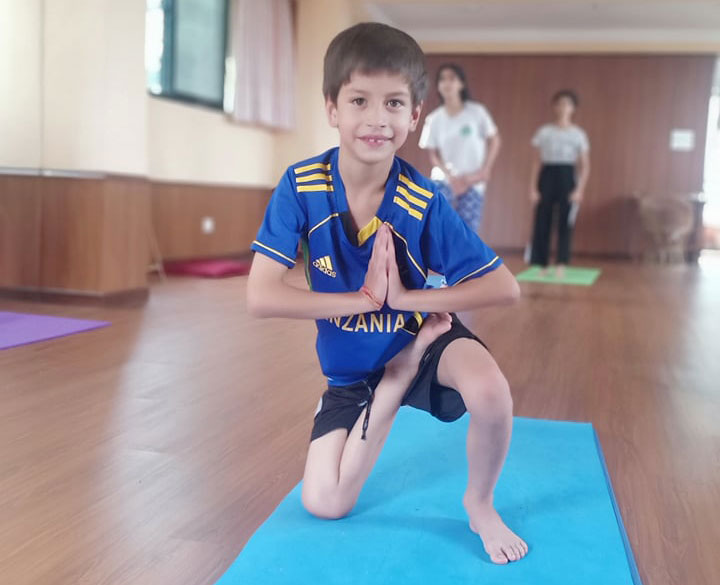
22 Aug 2020 HYN Himalayan Yoga Academy
Naturally, kids are born to learn from their environment. Kids are a form of God as pure as a lotus. Kids are like a sponge that absorbs everything around them so quickly. They normally do what adults do by copying them in different ways. Yoga is important for kids for many purposes in their lives. It is important for adults as well. Learn reasons to involve your Kids in Yoga Practice.
Children’s age is the best time for the initiation of yoga learning and practice. An Upa-nayan rite is the initiation of yogic life by offering the Gayatri Mantra, which enriches their true knowledge by reciting regularly. The means of Yoga helps kids to relax, relieve stress and anxiety, sleep better, improve emotional regulation, increase empathy, and improve mood and moral ethics.
‘Om Bhūr-Bhuvaḥ Svaḥ Tat-Savitur-Varēṇyaṁ; Bhargō Dēvasya Dhīmahi Dhiyō Yō Naḥ Prachōdayāt.! (Rigveda 3.62.10)
ॐ भूर्भुवः स्वः तत्सवितुर्वरेण्यं; भर्गो देवस्य धीमहि, धियो यो नः प्रचोदयात् ॥
Reasons to Involve Your Kids in Yoga Practice
1. Awareness and Self-Esteem
Yoga brings a lot of change in the physical and mental state of the person. So as its makes every functioning of the body more and more aware, those person who does yoga are more stress free and normally there every action are more focused and very sharp. If yoga is taught to the children, since children natural behavior is very naughty and restlessness, they seem to try fun in every work they do.
So normally they are not aware of their action. But yoga teaches them to balance their body and mind coordination and enhance their moral discipline. Hence, they try to become more aware of their action. Yoga also helps to cultivate increased self-esteem, self-confidence, and empathy within kids, which translates to more positive relationships with others by reflecting their positive attitude toward themselves onto others.
2. Yoga Improves Social Relationships
Yoga is typically regarded as an individual activity. While that is partially true, there is a social component to yoga, especially called Yama such as Ahimsa, Asteya, etc. We go to yoga classes with other people and take part in the yoga community where we can share our experiences with others.
For kids, the entire yoga practice is a social one. Yoga for kids typically includes songs, mantras, yogic games, Mudras, and other fun activities that get kids moving together and learning from one another, particularly with partner yoga poses. This creates a positive, engaging environment in which kids can have fun, feel pleasure, talk to one another, and learn to trust and respect one another.
3. Determination and Concentration Development
Yoga is a combination of concentrating on your breath, energy, attention, and limiting your thoughts. With children’s receptive nature, they will learn the art of concentrating on their breathing and focusing attention within no time. The skills, will, and interest, overall, impact their concentration levels.
Kids who practice yoga with different means like postures, pranayama, and meditation regularly find it easy to stay focused and concentrate for a more extended period. Their attention span is boosted, and their ability to grasp more is increased. If you want your kids to have an improved concentration span, at this epoch when it is hard to maintain concentration, tag kids in yoga practice.
4. Flexibility and coordination

Since Yoga also consists of physical activities, yoga is not only the yogasanas, it is more about flexibility, strength, and posture help enhance flexibility and coordination. Yoga Asanas builds the strength and flexibility of your child in an instant. For example, Malasana (Squat Asana) is a challenge – a pose that resembles sitting on an imaginary chair on the floor with your hands behind your legs, builds balance, strength, and flexibility.
Tagging your kids along for yoga practices enhances their body flexibility. Children who have a flexible body are healthy, confident, and strong. A flexible body results in better posture. The benefits accruing from having a better posture among children are numerous.
5. Yoga Improves Sleep
Getting the body moving before bedtime is an excellent way to improve sleep. When we are stressed or overwhelmed, our bodies are tense and our minds are full, reducing our ability to sleep well. This is also true for kids.
We tend to think that kids “have it easy” and that they don’t feel stressed, but this simply isn’t true. Kids aren’t stressed about finances or getting to work on time, but they are stressed out by their schoolwork and peer relationships. The physical practice of yoga also helps to relieve tension and release negative emotions held physically in the body, helping them to fall asleep faster and stay asleep longer.
6. Yoga Improves Strength and Breath Control
Especially Yogasana in Yoga takes some strength, both mentally and physically. When practiced regularly, we notice many physical, emotional, and cognitive changes within ourselves, particularly increased flexibility, upper body strength, enhanced vitality, and mental clarity. All of this newfound strength has much to do with the breath.
When we breathe harshly or quickly, we increase muscle tension, reduce focus, and heighten our fight-or-flight response, all of which have detrimental effects on our minds and bodies. Teaching proper breathing techniques, and building physical and mental strength from a young age, helps to reduce the chances of obesity, depression, and depressive symptoms, as well as increases self-esteem, self-confidence, and improves overall wellbeing.
7. Physical and mental stress
Yoga provides an avenue through which children can deal with physical and psychological stress. Due to the changing nature of children’s bodies, stress due to physical changes is bound to occur. When the stage comes, most parents are lost for ideas on what to do. If your child’s stress is on writing, the best writing help is available. Yoga is the solution as it introduces children to a nurturing and loving community that encourages self-acceptance. This helps children to discover their strengths and shortcomings.
As yoga’s core values are self-acceptance, your kids will find both physical and emotional stability. Additionally, health symptoms caused by anxiety and stress can be cured by yoga. As kids, these health symptoms are regular and frequent. A child with previous experience in yoga practice will have a better way of dealing with stress and anxiety as an adult, despite the child’s age.
8. Calmness in children
The manner of execution of yoga poses requires a great deal of enthusiasm, determination, and focus. The result is that a sense of clarity is achieved at the end that leaves your children’s body with calmness. Yoga teaches kids to relax. Unlike other sporting activities that have competitions, yoga is a non-competitive activity. Your child will be at peace and relaxed, knowing that it isn’t a competition.
Furthermore, the focus on breathing in and out results in relaxation. When a person is tired, they breathe in and out to relax their muscles, which also happens in yoga. As your child poses to breathe in and meditate, there is a general feeling of clarity.
9. Yoga Improves Independence and Coping Skills
As mentioned above, yoga is both a social and individual activity. One of the benefits of practicing an activity that is both individual and social is that it helps kids to recognize what “individual” and “social” mean.
Kids rarely do things on their own. After all, they are kids! It’s up to us adults to make the most of the decisions for them. However, it is still important that they learn how to do things on their own. Practicing yoga is a great way to introduce independence to your kids because their practice, and what they get out of their practice, is theirs and only theirs. By increasing independence in practice, we are also helping kids to develop their coping skills.
To Sum Up
All of these benefits make it clear that yoga is an important tool in our children’s physical, mental, and spiritual well-being. It offers optimum health, happiness, and harmony. Practicing yoga is something we do for ourselves, as adults, to help us unwind and reduce both physical and mental stress. Yogic practices make them focus and free of minds as well.
